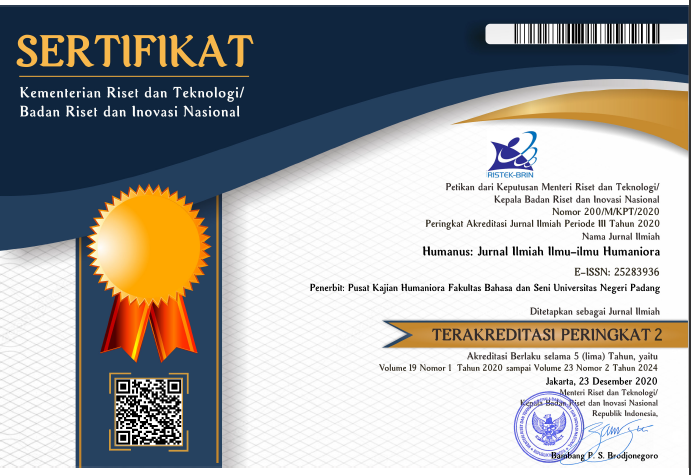POLITENESS STRATEGY TO PREVENT AND RESOLVE CYBER-CONFLICTS AMONG INDONESIAN INTERNET USERS: A CYBERPRAGMATICS APPROACH
 ), Sutiadi Rahmansyah(2), Iis Kurnia N(3),
), Sutiadi Rahmansyah(2), Iis Kurnia N(3), (1) Institut Teknologi Bandung
(2) Institut Teknologi Bandung
(3) Telkom University, Bandung
 Corresponding Author
Corresponding Author
Copyright (c) 2019 Humanus
DOI : https://doi.org/10.24036/humanus.v18i1.103049
Full Text:
 Language : en
Language : en
Abstract
Along with the rapid growth of Information and Communication Technology, legal, social, and cultural issues concerning the use of Internet and social media are becoming new problem lately. This research discusses conflicts that occur in the Indonesian cyber world related to the language used on internet-based communications. Prior to Indonesia's 2019 presidential election, the Indonesian social media and other internet-based communications, i.e. Facebook, has become a scene of conflict between supporters of presidential candidates or political party supporters who post updates and comments that are often notoriously provocative and potentially provoke not only verbal disagreements but also harassments and bullies related to ethnicity, groups, and religions. This purpose of this research is look deeply at the aforementioned problems. This study is mixed qualitative and quantitative research that uses digital ethnography method for data collection and pragmatics approach. The esult from this research is a - linguistic-based model for avoiding and resolving conflicts among users of internet-based communications.
Keywords: Internet-based Communications, Conflict, Resolution, Politeness, Cyberpragmatic
STRATEGI KESANTUNAN UNTUK MENGHINDARI DAN MENYELESAIKAN KONFLIK SIBER ANTARA PENGGUNA INTERNET DI INDONESIA: KAJIAN CYBERPRAGMATIK
Abstrak
Sejalan dengan cepatnya pertumbuhan teknologi informasi dan komunikasi, masalah hukum, sosial, dan budaya dan yang berkaitan dengan penggunaan Internet dan media sosial menjadi masalah baru akhir-akhir. Penelitian ini membahas konflik yang terjadi di dunia siber di Indonesia terkait dengan bahasa yang digunakan pada komunikasi berbasis internet. Sebelum pemilihan presiden Indonesia tahun 2019, media sosial Indonesia dan komunikasi berbasis internet lainnya, yaitu Facebook, telah menjadi sarana terjadinya konflik antara para pendukung kandidat presiden atau pendukung partai politik yang memposting status dan komentar yang sering kali juga bersifat provokatif dan berpotensi memprovokasi. Tidak hanya ketidaksetujuan secara verbal tetapi juga tindakan berupa pelecehan dan olokan yang terkait dengan etnis, kelompok, dan agama. Tujuan dari penelitian ini adalah melihat secara mendalam masalah yang disebut di atas. Penelitian ini menggunakan metode kualitatif dan kuantitatif yang didukung dengan metode etnografi digital untuk pengumpulan data dan pendekatan pragmatik. Hasil dari penelitian ini adalah model berbasis linguistik untuk menghindari dan menyelesaikan konflik di antara pengguna komunikasi berbasis internet.
Kata kunci: komunikasi berbasis internet, Konflik, Resolusi, Kesopanan, Siber-pragmatik
Keywords
References
Brown, P., & Levinson, S. (1987). Politeness: Some universals in language usage. Cambridge: Cambridge University Press.
Bargiela-C, F. (2003). Face and politeness: New (insights) for old (concepts). Journal of Pragmatics, 35. 1453–1469.
Coupland, N, Grainger, K., & Coupland J., (1988). Politeness in context: Intergenerational lssues. Languages in Society, 17, 253-262.
Culpeper, J. (1996). Towards an anatomy of impoliteness. Journal of Pragmatics, 25, 349–367.
Fraser, B. (1990). Perspectives on politeness. Journal of Pragmatics, 14, 219-236.
Goffman, E. (1967). Interaction ritual; Essays on face-to-face behavior. Garden City, N.Y: Doubleday. Chicago (Author-Date, 15th ed.)
Goodwin, C., Goodwin, & M., Harness. (1990). Interstitial argument. In: Grimshaw, Allen D. (Ed.), Conflict Talk: Sociolinguistic investigations of arguments and conversations. Cambridge University Press, Cambridge, pp. 85–117.
Kozinet, R. V. (2010). Netnography: Doing ethnographic research online. California: Sage Publication.
Labov, W. (1972). Language in the inner city: Studies in the black English vernacular. Blackwell, Oxford: Oxford University Press.
Labov, W. & Fanshell D. (1977). Therapeutic discourse: Psychotherapy as conversation. New York. Academic Press.
Lakoff, R. (1989). The limits of politeness: Therapeutic and courtroom discourse. Multilingual, 8(2/3), 101-131.
Mehan, H. (1990). Rules versus relationships in small claims disputes. In: Grimshaw, Allen D. (Ed.), 1578 J. Culpeper et al. / Journal of Pragmatics 35 (2003) 1545–1579 Conflict Talk: Sociolinguistic Investigations of Arguments and Conversations. Cambridge University Press, Cambridge, 160–177.
O’Grady, G. (2014). The use of key in projecting face-threatening acts in televised political debate. Text & Talk, 34(6), 685–711.
Penman, R, (1990). Facework and politeness: Multiple goals in courtroom discourse. Journal of Language and Social Psychology, 9, 15–38.
Stieglz, S., & L., Dang-Xuan. (2012). Social media and political communication: A social media analytics framework. Social Network Analysis and Mining: 1277-279.
Vuchinich, S. (1990). The sequential organization of closing in verbal family conflict. In: Grimshaw, A.D. (Ed.), Conflict Talk. Cambridge University Press, Cambridge, pp. 118–138.
Yus, F. (2011). Cyberpragmatics: Internet‐mediated communication in context. Philadelphia: Benjamins.
 Article Metrics
Article Metrics
 Abstract Views : 1167 times
Abstract Views : 1167 times
 PDF Downloaded : 320 times
PDF Downloaded : 320 times
Refbacks
- There are currently no refbacks.
Copyright (c) 2019 Humanus

This work is licensed under a Creative Commons Attribution-NonCommercial 4.0 International License.










